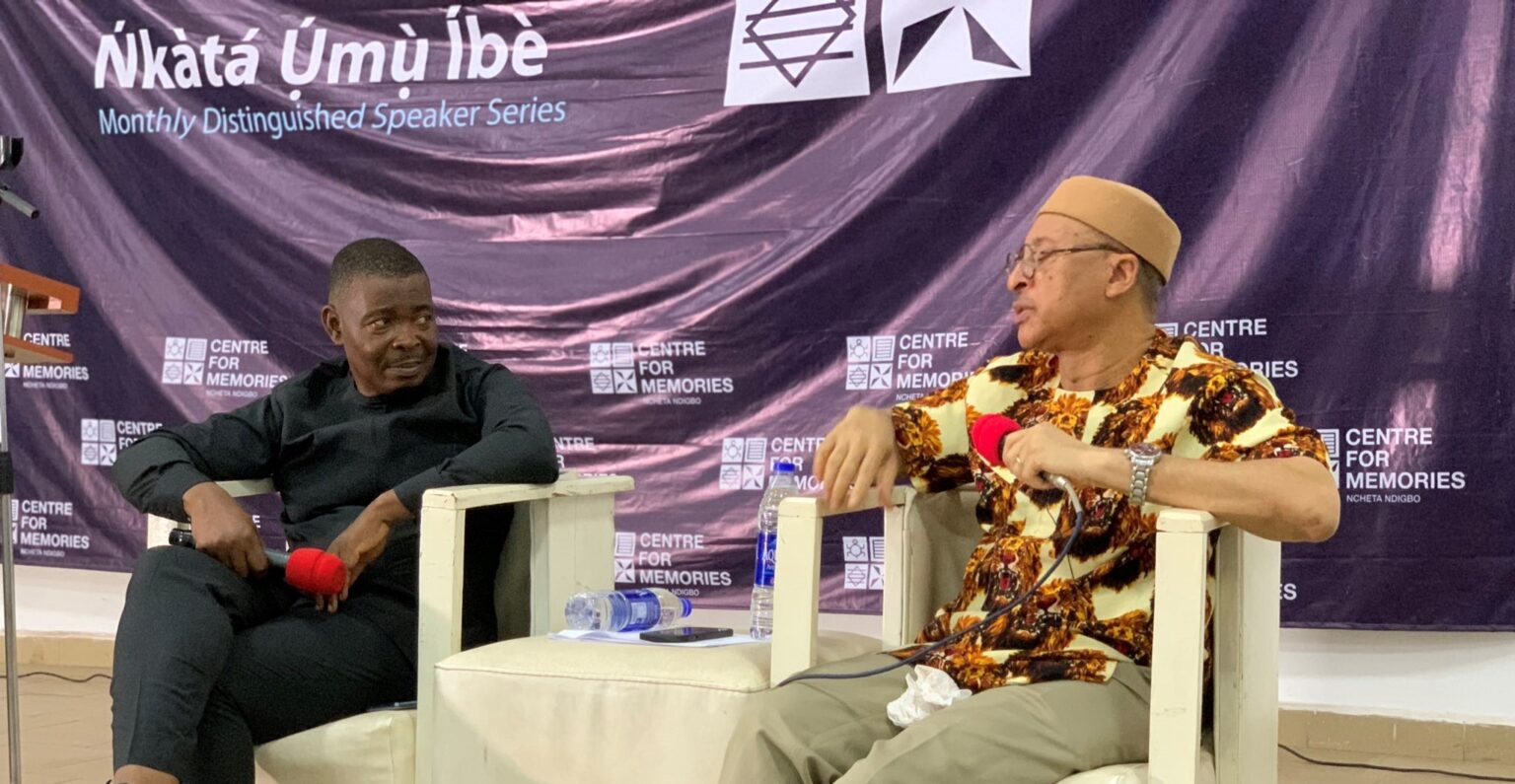By Our Reporter, Abuja
Professor Pat Okedinachi Utomi, Friday, called for a more cordial relationship between Igbo intellectuals and Igbo men and women of commerce if the people must make any progress in the wider Nigerian polity.
Utomi stated this position in his remarks as the Monthly Distinguished Speaker, at “Nkata Umu Ibe,” organized by Centre For Memories, CFM, at Enugu Sports Club.
The scholar who spoke on the topic “Ako bu mmeri: The Paradox in Igbo Ascendency,” sought to understand why Igbos in one generation typecast and stereotyped as modest, even stingy, bland, and self-effacing achieved so much and became “Enyimba” whereas another generation considered loud, brash, vain and bombastic delivered outcomes of challenged relevance for the people.
“The central object of the conversation I hope to stimulate today is built on the question of how a people regarded and stereotyped as modest, even stingy and ever self-effacing became Enyimba, yet one generation later, a succession culture considered vain, loud, bombastic, and brash delivers outcomes of challenged strategic relevance for the people.
“What are the factors important for understanding this paradox?” Utomi queried.
The political economist explained that the transition from the precolonial Igbo society, the high achievement section of the First Republic, driven by the political and economic culture of competitive communalism and the post-war elevation of cash over wisdom were at the root of the paradox.
“The laying out of the challenge of choice in culture, between money and wisdom, character and cash, civility, and brash showiness, have resulted in myths that have been reified into concrete forms in Nigerian consciousness that have become the stereotypes that others judge Ndigbo by. And these, it would seem have eroded the strategic relevance of Ndigbo in the Nigeria project,” Utomi posited.
Professor Utomi further argued that with the work ethic of Igbos, their talents and achievement have never been in doubt. Yet he is of the view that with all his achievements and talents, the Igbo man is yet to crack the problem of being marginalized in the wider Nigeria project.
“The question that then deserves to be asked is why does this achieving people seem so evidently among the most marginalized in the Nigeria project? The answers may lurk in the values underpinning the post war new rise of Ndigbo.”
According to Utomi, Igbo leaders of the First Republic were able to hold their turf and matched the South-West stride for stride in education and industrialization.
“In the colonial cash crop economy geared to feeding raw materials into factories in metropolitan Europe the Igbo areas generated produce in palm as the Western Region did primarily in cocoa and the North in groundnuts (peanuts). The surpluses from these translated to reserves in the accounts of the produce marketing boards of the regions in London. The revenues were, according to Dr Pius Okigbo, in his book Nigerian Public Accounts, quite quickly drawn down between 1957 and 1960. The destination of the drawn down funds were the new development goals of education, manufacturing, agriculture, and infrastructure…
“If you go to the other arena of competition in the competitive communalism of the Independence era, industrialization, you will find Dr Michael Okpara’s response to the Ikeja Industrial estate with both Aba and Trans-Amadi industrial layout in Port Harcourt. Pfizer was even attracted away from Ikeja to Aba. All these achievements moved Eastern Region to bragging rights of the fastest growing economy in the world. These times were marked by communal collective but not collectivist action,” Utomi argued.
But the civil war, according to Utomi, “one of the great seven calamities of the 20th century for the Igbo nation,” changed everything. After the war the culture of deification of cash and the philosophy of “aku na esi obi-ike” turned Igbos to loud and brash people.
“The oil boom which made public officers wheeler-dealer rent seekers was paradise for the hustler man in commerce. The Igbo businessman profited phenomenally from such. It made him louder as his bank account flowered. And commentators went to town with stereotypes of Ndigbo. I think this has been played to downplay the strategic worth of Ndigbo. A new narrative is needed. In my view, a planned culture change effort which draws from the past could be worth exploring. I say this bearing in mind the experience of China,” he said.
Utomi insisted that Igbos, like the Chinese, needed to be reminded of who they were before the civil war in the bid to engineer a new civic culture. And to do so, he suggested a rapprochement between Igbo intellectuals and Igbo people of commerce. As he elegantly put it, “to do so the men of commerce in Igboland and the Intelligentsia have to find happy accommodation. This has not been the case yet and I have personal experience of it.”
Before the lecture, Professor Utomi had earlier spoken to the young people of the South-East on a mentoring session, where he advised them to set forth at dawn in achieving their dreams without minding their ages.
The first five people that arrived at the mentoring session were gifted copies of his book, The Art of Leading.

